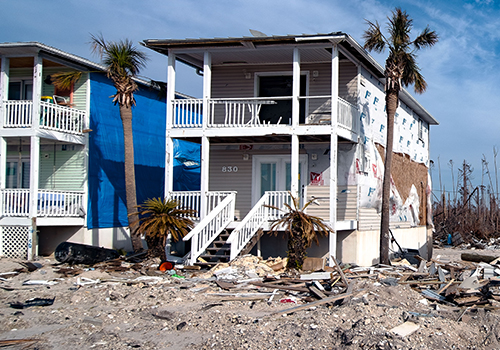Florida's Hurricane Deductible
Are you aware if you have windstorm/hurricane coverage on your homeowners’ policy, you may also have a separate hurricane deductible? Do you know how a hurricane deductible impacts your claim? Do you know when it applies to a claim?
Florida laws are very specific regarding when the hurricane deductible applies, for what duration of time and how many times it can be applied in a calendar year. Review the resources below to better understand how a hurricane deductible can impact your claim.
Florida's Hurricane Deductible Guide
Disaster Preparedness Resources
What is the definition of a hurricane for insurance purposes?
A hurricane is defined in s. 627.4025, F.S., as a storm system that has been declared to be a “hurricane” by the National Hurricane Center of the
National Weather Service.
What is the definition of hurricane coverage?
“Hurricane coverage” is coverage for loss or damage caused by windstorm during a hurricane. The term includes damage to the interior of a building or to property inside a
building, caused by rain, snow, sleet, hail, sand or dust if the direct force of the windstorm first damages the building, causing an opening through which rain, snow, sleet, hail, sand or dust enters and causes damage anywhere in the state of Florida.
This is also found in s. 627.4025, F.S.
When does the hurricane deductible apply?
According to s. 627.4025, F.S., the duration of a hurricane in which the hurricane deductible would apply
includes the time period:
1) Beginning at the time a hurricane warning is issued for any part of Florida by the National Hurricane Center. Remember, it must be a “hurricane” declared by the National Hurricane Center; and
2) Ending 72 hours following the termination of the last hurricane watch or hurricane warning issued for any part of Florida by the National Hurricane Center.
Please note: When a hurricane deductible is applied, no other deductible under the policy may be applied.
What are the hurricane deductible options?
All insurance companies must offer hurricane deductible options of $500, 2 percent, 5 percent, or 10 percent of the policy dwelling or structure limits, unless the specific percentage deductible is less than $500. The hurricane deductible must be listed as a dollar amount, even if the deductible is listed as a percentage amount.
There are a few exceptions to the hurricane deductible amounts that must be offered. The exceptions are:
1) Dwellings insured for at least $100,000 through $249,999: Instead of offering a policy with a $500 deductible, an insurance company may offer a policy that guarantees that the company will not non-renew the policy in order to reduce the hurricane loss for one 12-month renewal period. However, the policy may include up to a 2 percent hurricane deductible.
2) Dwellings with insured limits of $250,000 or more: The insurance company does not have to offer the option of a $500 hurricane deductible, but must offer options of 2, 5, or 10% hurricane deductible
3) Any Dwelling with insured limits of less than $500,000: The policy may not have a hurricane deductible in excess of 10 percent unless:
a) The policyholder must personally write or type and provide to the insurance company the following statement and sign his or her name, which must also be signed by all other named insureds on the policy and dated: “I do not want the insurance on my home to pay for the first (specify dollar value) of damage from hurricanes. I will pay those costs. My insurance will not.”
b) If the insured structure has a mortgage or lien, the policyholder must provide the insurance company with a written statement from the mortgagee indicating the mortgagee approves the policyholder’s election of the specific deductible.
4) Dwelling risks with limits between $1 million and $3 million: the insurance company may offer hurricane deductible options of 3%, 5% and 10% in lieu of the 2%, 5% and 10% options.
5) Dwelling risks with limits in excess $3 million: the insurer only needs to offer the 5% and 10% options.
Reference: s.627.701, F.S.
How is the hurricane deductible applied to my policy?
- The hurricane deductible of a personal lines residential applies on an annual basis to all covered hurricane losses that occur during the calendar year for losses that are covered under one or more policies issued by the same insurer or an insurer in the same insurer group.
- If a hurricane deductible applies separately to each of the one or more structures insured under a single policy, then the deductible will apply for each structure.
- The hurricane deductible is applied on an annual basis if you are insured by the same insurance company or an insurance company from the same group for all subsequent hurricanes.
This means if you are insured with the same insurance company or an insurance company within the same group when windstorm damage occurs from a second hurricane during the same year, the deductible for the second hurricane will be the greater of:
- The amount left over from the first hurricane deductible, if the deductible was not fully met or
- The “All Other Peril” deductible as stated on the policy.
If the hurricane deductible was met in full with the first covered windstorm claim, the “All Other Peril” or standard deductible would apply to other windstorm claims resulting from a hurricane that occurs in the same year.
However, if a policyholder has windstorm damage resulting from the first hurricane of the policy term, and then moves the policy to a different insurance company that is not a part of the original insurance company’s group, the hurricane deductible applies in full to the second claim without any credit given for the first hurricane deductible that occurred the same year.
Policyholders should always file claims even when the cost to repair the windstorm damage is less than the hurricane deductible. If you file the claim, the company has a record of the amount of credit that should be applied towards the hurricane deductible for the second or subsequent windstorm claim resulting from a hurricane. Also, it is very common to discover hidden damage once the contractor begins repairs. If you have already filed the original claim, a supplemental claim can be easily added to the total amount. It may cause additional delays and even a claim denial if the original windstorm damage was not reported timely to the insurance company.
Example
The policyholder has $200,000 in insurance coverage on his home with a 2 percent ($4,000) hurricane deductible. The “All Other Peril” deductible is $1,000. The policyholder filed the following windstorm claims resulting from hurricanes this calendar year and has not changed insurance companies:
Hurricane 1: Hurricane 1 caused windstorm damage of $2,000. Since the hurricane deductible is $4,000, the policyholder must pay for the repairs out of pocket; the insurance company credited the $2,000 claim to the calendar year hurricane deductible. This leaves a hurricane deductible balance of $2,000, which will apply to a second windstorm claim resulting from a hurricane that occurs in the same calendar year. The $2,000 deductible balance is greater than the “All Other Peril” deductible of $1,000.
Hurricane 2: Hurricane 2 caused windstorm damage of $5,000. The balance of the hurricane deductible from Hurricane 1 is $2,000. Since the remaining balance of the hurricane deductible of $2,000 is greater than the “All Other Peril” deductible of $1,000, the balance of $2,000 will be subtracted from the amount of damage caused by Hurricane 2. After the balance of $2,000 has been applied, the full calendar year hurricane deductible is met. The insurance company will pay the repair balance of $3,000 for Hurricane 2 and all subsequent windstorm claims resulting from hurricanes that occur within the same calendar year will have the “All Other Peril” deductible of $1,000 applied to each claim.
For commercial residential policies, such as policies issued for condo associations or apartment buildings, an insurance company must provide the option of either a hurricane deductible as described above or an option of a separate hurricane deductible applicable for each hurricane.
What if my policy is through a Surplus Lines company?
Most insurers can be divided into two broad categories. Admitted or Authorized insurers and Surplus Lines insurers. An Admitted or Authorized insurer is one that is authorized to write business by the Florida Office of Insurance Regulation (OIR) under a Certificate of Authority. These insurers must file their rates and forms with the OIR for approval. Their policyholders have the protection of the Florida Insurance Guaranty Fund (FIGA) in case the insurer becomes insolvent. The Surplus Lines companies are made eligible by the OIR to write certain business that the Admitted/Authorized insurers are unable or unwilling to. These companies do not need to file their rates or forms with the OIR, and their policyholders are not protected by the FIGA.
Therefore, policies issued by the Surplus Lines companies may have deductibles different from the ones described above. It is advisable for you to read your policy and contact your agent for any clarification.
How does the Inflation Guard endorsement affect coverage and the hurricane deductible?
Inflation Guard is an endorsement added to most property replacement cost insurance policies. This endorsement provides that the policy limits will increase by a certain percentage at regular intervals. The Inflation Guard endorsement helps the amount of your coverage keep up with current construction costs.
The Inflation Guard endorsement can affect the amount of coverage in force at the time of a hurricane loss and the amount of the deductible applied. It will only affect hurricane deductibles that apply as a percentage. This can change the amount a policyholder receives for a hurricane claim filed against their homeowners’ policy when the hurricane deductible is shown as a percentage.
The insurance company must disclose on the policyholder’s Declarations Page if the inflation guard endorsement may cause the hurricane deductible to be higher than indicated when a loss occurs.
All Other Peril Deductible: The amount of money a policyholder must pay out-of-pocket toward damages or a loss before their insurance company will pay for a claim. If you file a claim and it is covered, the deductible is subtracted from the amount paid by the insurance company. The “All Other Peril” deductible applies to damages that are caused by perils other than hurricanes.
Roof Deductible: The amount of money a policyholder must pay out-of-pocket toward damage or loss to the roof before the insurance company will pay for the claim. If you file a claim for roof damage and it is covered, the deductible is subtracted from the amount paid by the insurance company. A roof deductible cannot be applied for a roof loss resulting from a hurricane.
Coverage A / Dwelling Coverage: A dwelling is a building occupied primarily as a private residence. The dwelling coverage also includes structures that are attached to the dwelling, such as, a garage, deck, patio, or porch.
Declarations Page: The Declarations Pages, also known as the "Dec Page(s)", are the first one or two pages of a policy which contain the specific policy information. For example, the name of the insurance company, policy number, the different types of coverages included in the policy, coverage limits and coverage costs, deductibles, any fees and assessments, and any other statement(s) required by law. These pages typically outline the form and the endorsement numbers as well. Additionally, the "Dec Pages" also include the name and mailing address of the policyholder, the physical address of the insured property (if different than the mailing address), and the name, mailing address, and contact information of the insurance agent who issued the policy.
Hurricane: A storm system that has been declared a hurricane by the National Hurricane Center.
Hurricane Coverage: Insurance coverage for loss or damage caused by windstorm during a hurricane. The term includes damage to the interior of a building or to property inside a building, caused by rain, snow, sleet, hail, sand, or dust if the direct force of the windstorm first damages the building, causing an opening through which rain, snow, sleet, hail, sand, or dust enters and causes damage, anywhere in the state of Florida. This does not include coverage for flooding.
Hurricane Deductible: The amount noted on the policy "Dec Page", which is paid by the policyholder before an insurance company issues any payment for damage caused by a hurricane. The deductible amount is generally subtracted from a claim payment prior to the issuance of the check.
Hurricane Deductible Option: The varied dollar or percentage choices available under the policy contract.
Hurricane Watches and Warnings: A warning means that hurricane conditions are expected, a watch means that hurricane conditions are possible. These are alerts issued by the National Hurricane Center regarding the approaching storm system. Watches are issued 48 hours in advance of the anticipated onset, and warnings are issued 36 hours in advance of the onset of tropical storm force winds within a specified area.
Hurricane Coverage Exclusion: All insurance companies authorized to issue property insurance by the Office of Insurance Regulation (Surplus Lines are not included), must make an exclusion of windstorm coverage available. The coverage may be excluded if the policyholder personally writes or types and provides to the insurance company the following statement in his/her own handwriting and signs his/her name, which must be signed by all named policyholders on the policy: “I do not want the insurance on my (home/mobile home/condominium unit) to pay for damage from windstorms. I will pay those costs. My insurance will not.” If there is a mortgage holder or lien holder, they must give their written permission for the coverage to be excluded. This is allowed by, and subject to provisions outlined in s. 627.712, F.S.
Calendar Year Hurricane Deductible:
If you are insured by the same insurance company or an insurance company from the same insurance company group, the hurricane deductible applies on an annual basis to all covered losses which occur during the calendar year.
This means if you are insured with the same insurance company or an insurance company within the same group when windstorm damage occurs from a second hurricane during the same calendar year, the deductible for the second hurricane will be the greater of:
- The amount left over from the first hurricane deductible, if the deductible wasn’t fully met or,
- The “All Other Peril” deductible as stated on the policy.
If the hurricane deductible was met in full with the first covered windstorm claim, the “All Other Peril” or standard deductible would apply to other windstorm claims resulting from a hurricane that occurs in the same year.
Learn more about your hurricane deductible and when it applies.
Available for Download in English or Spanish
Natural Disaster:
Hurricanes aren't the only disasters that Floridians need to be prepared for each year. Wildfires, floods, tornadoes and sinkholes are other reasons why it pays to make sure your homeowners' insurance is adequate,
and that your financial interests are up-to-date and protected. This guide contains information that can be extremely valuable in the event of a natural disaster.
Available for Download in English or Spanish
Disaster Assistance:
This brochure offers tips on dealing with damage from hurricanes and other natural disasters, including numbers to call for assistance with insurance issues.
Available for Download in English or
Spanish
The Flood Claims Process:
Learn more about what to expect after reporting a flood claim to your insurance company or agent.
Available for Download in English



